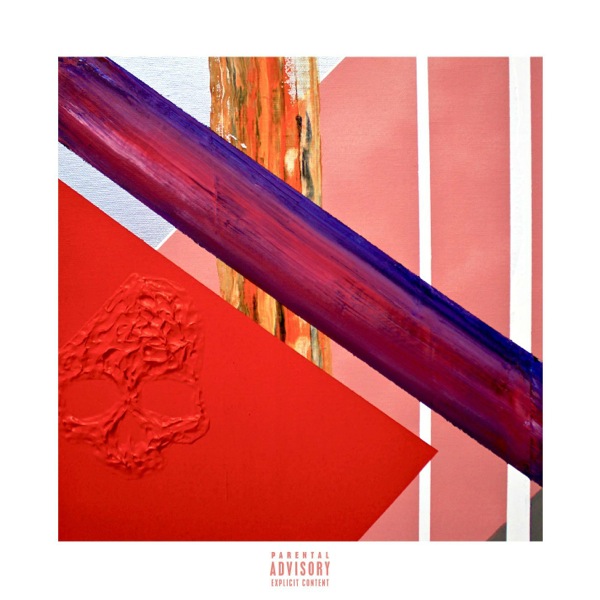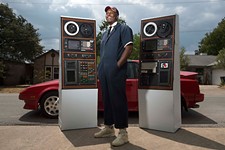Lupe Fiasco: Tetsuo & Youth
Chicago MC delivers a meta-religious tome
By Kahron Spearman, 4:30PM, Wed. Jan. 28, 2015
With near constant artist/label strife over his previous two albums, it took threats from hacktivist group Anonymous to force Atlantic Records to provide a hard release date (Jan. 20) for Lupe Fiasco’s fifth album, Tetsuo & Youth.

The top layer radiates a neorealist patina, similar to Charles Burnett’s acclaimed 1977 film Killer of Sheep. In it, husband, father, and sheep slaughterer Stan struggles in a plot-less reality. A narrative through line isn’t the point, however, as Stan’s life represents the circular inner arguments of a person only just surviving L.A.’s urban ghetto Watts. Tetsuo & Youth realizes the same depth, employing a similarly jumpy, plot-negative approach, and hip-hop as its soundtrack.
“Summer” opens the album as a slate cleanser, with children in the water, summer sun surely beaming down as they play. It’s the height of innocence, and perhaps existence. These interludes occur throughout, breaking subject matter while tying ends together. “Mural” features the wordsmith as the preeminent “God MC,” leveling with a force majeure metaphor and alliteration usage.
“Blur My Hands” kills haters with kindness, while also demonstrating forgiveness. “Dots to Lines” contains a banjo solo, leading into what Fiasco feels is the righteous path to truth: using ancient and sacred geometry. Then the jazzy “Fall” changes sets, and we find ourselves incarcerated – after apparent judgment – on “Prisoner 1 & 2.”
Its first half shows the viewpoint of an inmate, a detailed examination of the daily lives of those likely to never leave:
Love is looking over various errors, And hate is habitually accelerating terror, Everywhere but the mural. I just wanna be collected when I call goddamn. I don’t wanna be accepted; not at all as I am. Visitor, visitor, prisoner, prisoner, land.
In the turnover, Fiasco compares the current prison system to the old Jim Crow laws. A deranged “turn up” appears when he raps from the position of a prison guard, stuck in his own “trap” of using power to corrupt. “Body of Work” delves into the gangrenous effect of greed, its third verse utilizing the tragedy of Oedipus Rex:
Realize my begin when I find where my end. This Oedipus wrecks, motherfucker this better than sex. Material potion the love of my martyr, Currency soaked in the blood of my father.”
The connection ties the tale to Jesus, within the context of childhood, and the Buddha, within the context of people unconsciously creating illusions, such as material things as a savior.
“Little Death” features the rapper spinning yard about temptation and transitions in relationships, from the primal to possession of the self and to other people and things. Unofficial part two “No Scratches” suggests they separate before they crash with, and into each other, to no avail. This is the turning away from faith, before the swirling “Winter” foretells certain death.
Fiasco flips metaphor in “Deliver,” presenting commentary on violence and hypocrisy on top of the deliverance aspect of the pizza man/peace of man. The son faces his death as his “Madonna” is left disillusioned. The use of the name is essential, as the Lord was born of an unseen father, similar to young black men. Mothers of the fatherless are viewed with significant reverence, even as immaculate.
A richer texture is added in “Adoration of the Magi.” Fiasco parallels the imagery of baby Jesus with those of rappers’ album covers, i.e. Ready to Die and Illmatic. In doing so, he tackles the reasoning in why “babies” want to live lives they haven’t been prepared for, while, conversely, prodigies are constantly praised – the adoration and forcing into a stunted manhood, which inherently strips down innocence.
Why you ready to die? You just a baby. Why them tears up under your eyes? You just a baby. Keep your head up in the sky. You just a baby. Quit chasing money, never mind, you just a baby (These Magi adore you.) Why you wanna be born again? You just a baby. Why you playing in the streets? You just a baby.
The album closes (and starts) with “They.Reminisce.Over.New,” featuring Ab-Soul and the fitting Tron theme. “Spring” represents the youthful return, a resurrection of man as the child with renewed innocence. It’s also another chance from a blended Christian/Buddhist perspective. The birth, the adoration, the crucifixion, death, and resurrection, over and over.
Jesus told his disciples in Matthew 18:3 (New International Version):
And he said: “Truly I tell you, unless you change and become like little children, you will never enter the kingdom of heaven.”
A note to readers: Bold and uncensored, The Austin Chronicle has been Austin’s independent news source for over 40 years, expressing the community’s political and environmental concerns and supporting its active cultural scene. Now more than ever, we need your support to continue supplying Austin with independent, free press. If real news is important to you, please consider making a donation of $5, $10 or whatever you can afford, to help keep our journalism on stands.
Sept. 15, 2023
Sept. 8, 2023
Lupe Fiasco, Tetsuo & Youth, Charles Burnett, Killer of Sheep, Oedipus Rex, Jesus, Buddha, Madonna, Nas, Notorious B.I.G.









